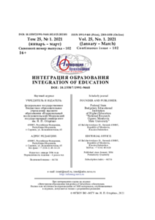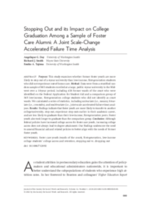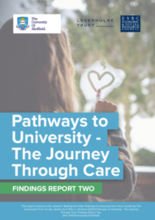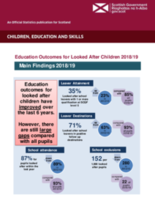Displaying 11 - 20 of 350
The study sought to reveal socio-psychological factors of successful integration of institutionalized adolescents into mainstream schools.
This brief resource from Who Cares? Scotland explores barriers to graduation for care-experienced young people, including moving placement, lack of space or equipment to study, challenges with mental health, finances, and housing, to name a few.
This study examines whether former foster youth are more likely to stop out of a 4-year university than low-income, first-generation students who did not experience out-of-home care.
This paper examines the effects of Human Rights Education (HRE) on youth in the impoverished community of Trevo in Mozambique, particularly orphans and vulnerable youth.
This study assessed educational opportunities and the support available to orphans and vulnerable children (OVC) in Bagamoyo District to determine socioeconomic and psychological factors that limit access to education.
The authors of this study conducted research with 234 care experienced university students in England and Wales to explore their experiences of the journey through care.
This study sought to determine whether home environments with higher levels of emotional support and cognitive stimulation predict later academic achievement and whether this relationship is moderated by placement type (i.e. biological/adoptive parent care, kinship care, or non-kinship foster care). This study included 1,206 children from the second U.S. National Survey of Child and Adolescent Well-Being (NSCAW-II) who were involved with Child Protective Services (CPS) between 2–7 years of age.
The annual update on Education Outcomes for Looked After Children covering 2018-19 has been released by Scotland’s Chief Statistician.
The goals of this article were to (a) examine the changes in educational achievements of children in care from preschool through the end of primary school; (b) identify subgroups exhibiting distinct educational trajectories; and (c) explore key predictive individual, care, and school characteristics.
This brief article from Student Affairs Today highlights some of the lessons learned by student affairs professionals regarding foster care support programs at higher education institutions in the United States in light of the COVID-19 crisis.







